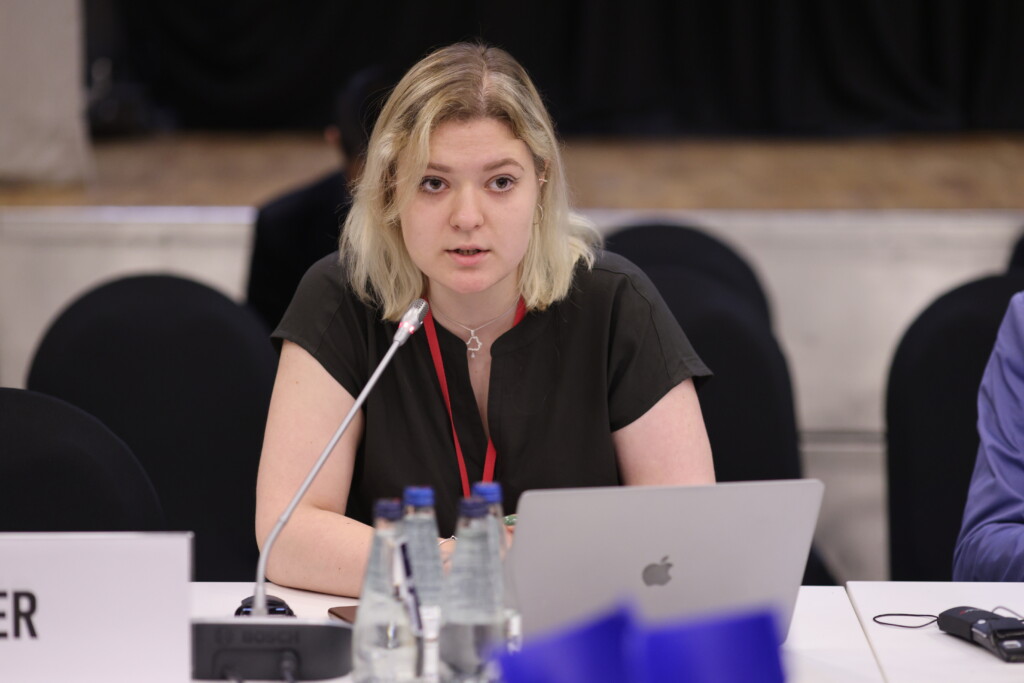The Centre for Constitutionalism and Human Rights of the European Humanities University was honoured to participate in the human dimension conference organised by the Polish Chairmanship-in-Office of the Organisation for Security and Cooperation in Europe. The conference was held in Warsaw from September 26 to October 7. It was dedicated to discussions on the condition of human rights and fundamental freedoms in the OSCE area.
During plenary sessions, participants had the opportunity to address the entirety of the OSCE human dimension commitments: Democratic Institutions, Rule of Law, Tolerance and Non-Discrimination, Fundamental Freedoms and Humanitarian Issues.
The CCHR was represented by an associate member and made an intervention during Plenary Session VII: Rule of law II. As a representative of civil society running educational activities related to the profession of a lawyer and promoting Human Rights, the Center paid special attention to the new challenges met by the lawyers and legal professionals of the countries of Eastern European region and proposed a few first steps on the way to responding to the challenges.
Below you can find the intervention based on the recent activities of the Center and topics discussed at the conference’s plenary sessions.

The Center for Constitutionalism and Human Rights of the European Humanities University – a belarusian university in exile, located in Lithuania since 2004. The Centre concentrates on the educational and institutional activities related to the emerging challenges in the countries of Eastern European region, preserving its aim to promote the rule of law and human rights based approach.
The right to a fair trial presumes the independence of the justice system and the rule of law. Today we cannot ignore that with the threat to global peace, legal remedies are being forced out of our region by authoritarian governments.
Nevertheless, justice has to preserve its role, including as the means for solving conflicts and preventing the impunity of perpetrators. The absence of justice and the dependence of the justice systems lead to the escalation of violence first locally and then globally. At the moments when authoritarian states destroy justice, including through the banishment of lawyers who provide legal assistance, as they are considered as a special threat to authoritarian governments, the international democratic community has to provide the opportunities for lawyers to remain the essential part of the guarantee of the right to a fair trial.
The lawyers are the persons who remain the guides to human rights for legal systems and stand for the administration of justice, in spite of the risks related to the persecution and threats to life because of their activity.
The lawyers have to be guaranteed their right to independence and to be provided the right, possibilities and mechanisms to continue their practice so that to promote justice, human rights, and contribute to the right to a fair trial internationally, while it is being denied locally, in and because of the authoritarian countries.
The lawyers and professionals of the Eastern-European Partnership region support the efforts of the Council of Europe in the creation of a new legally binding document on the profession of Lawyer, and underline the need to update the traditional understanding of the status and definition of a lawyer, taking into account the status of the human rights defenders.
Hence, we want to draw a special attention of the countries and international community to the importance of:
- the support of the CoE in their efforts related to the creation of the instrument for the protection of the professional standards of the legal profession;
- The work on the increase of the respect for legal remedies and widen the practice of inter-state complaints and the implementation of the erga omnes principle in the cases of serious and massive human rights violations.
- The support of lawyers and legal professionals by a consistent application of the Human Rights Defenders Declaration and include provisions into a new CoE instrument provisions which will recognise human rights lawyers status and their right to practice despite the place of their forced relocation and despite the repressive government actions and legislation controversial to the UN Statute and human rights treaties goals.

